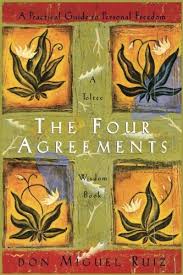Domestication and the Dream of the Planet
byDomestication and the Dream of the Planet is a powerful concept introduced in The Four Agreements, delving into the ways human consciousness is shaped and controlled by societal expectations. The chapter opens with a striking observation: the life we experience, both when we are awake and asleep, is not purely our own creation but instead a dream—constantly shaped by our thoughts, perceptions, and the collective influences of society. This “dream of the planet” is an ever-evolving narrative, where the boundaries between our waking lives and sleeping dreams blur. The primary distinction, however, is that while we have little control over our dreams during sleep, the waking dream is constructed by the internalized beliefs and ideas we are taught by our families, culture, and society at large. This societal dream dictates much of our behavior, shaping the way we view the world and our place within it.
The idea of the “dream of the planet” is explained as a massive, interconnected tapestry formed by the collective human consciousness. It’s the invisible force that binds us, dictating everything from cultural norms and religious beliefs to the social roles we take on from birth. As we grow up, we are taught to conform to these societal expectations, absorbing them through direct instruction and observation. From the language we speak to the actions we take, we are conditioned into believing that the rules of this dream are the only way to live. This process of socialization leaves little room for deviation from the accepted norms, causing us to internalize this collective dream as our own reality. What we don’t realize is that we have been subtly domesticated into following these unwritten societal rules, and our ability to think outside the boundaries of this dream is suppressed.
The concept of “domestication” is pivotal in the chapter, with Ruiz comparing the process to how animals are trained to behave through a system of rewards and punishments. Human beings are similarly conditioned by external forces, particularly during childhood, to adopt behaviors and beliefs that conform to the larger societal framework. This system is deeply ingrained, often so much so that individuals never question the rules they’ve been taught. We simply accept the standards set before us, whether they pertain to our roles in relationships, our professional lives, or our social interactions. The problem with this process is that it strips away our freedom to make independent choices. We are molded to think, act, and feel in ways that society deems acceptable, often to the point where our true selves are lost under layers of societal expectation. The names we carry, the religions we practice, and the expectations placed upon us are all inherited, passed down from one generation to the next through this domestication process.
Ruiz critiques this process, noting that it robs individuals of their natural freedom and creativity, leaving them to adopt a “false self.” This false self is driven by the fear of rejection and the desire to gain acceptance from others. Over time, we begin to judge ourselves according to the standards of this domesticated dream, measuring our worth based on an impossible set of rules. Our internal belief system, referred to by Ruiz as the “Book of Law,” dictates how we see ourselves and how we interact with others. Unfortunately, this internal law is often harsh and unforgiving, constantly pushing us toward self-judgment and self-rejection. If we fail to meet the expectations set by this law, we are left feeling unworthy, guilty, and emotionally distressed. This inner turmoil and cycle of punishment is one of the most destructive consequences of living within the societal dream, as it keeps us trapped in a constant state of fear, guilt, and self-doubt.
This “dream of hell,” as Ruiz calls it, is characterized by ongoing emotional suffering due to fear, judgment, and rejection—both from external sources and from within ourselves. The chapter emphasizes that this societal dream becomes a prison, restricting our ability to express ourselves authentically and freely. Instead of living from a place of peace and self-love, we become slaves to the negative judgments that others and we ourselves impose upon us. The author argues that this dream prevents us from living a life of true fulfillment, as we are constantly chasing approval and trying to fit into a mold that doesn’t align with our true nature. This way of living—rooted in fear, guilt, and rejection—limits our potential for happiness and prevents us from fully experiencing the freedom of being our authentic selves.
In contrast, Ruiz suggests that there is a possibility of escaping this constrictive dream by breaking free from the restrictive agreements we’ve made, often unknowingly, with society, our families, and ourselves. By letting go of the false self created by domestication, we can start living a life that is based on self-acceptance, love, and truth. Ruiz emphasizes that the key to breaking free lies in conscious choice—choosing to create a new dream, one that reflects who we truly are. This new dream is founded on love, peace, and the acceptance of oneself and others. By embracing this new way of living, we can experience a life free from the limitations imposed by the “dream of the planet.” It’s a call to embrace personal freedom and authenticity, and to let go of the suffocating fear and judgment that have shaped so much of our existence. In doing so, we can begin to create a new reality that fosters happiness, self-empowerment, and true inner peace. The ultimate goal is to shift from living within the confines of the old, fear-driven dream to embracing a life rooted in love, freedom, and authenticity, paving the way for a brighter and more liberated future.


